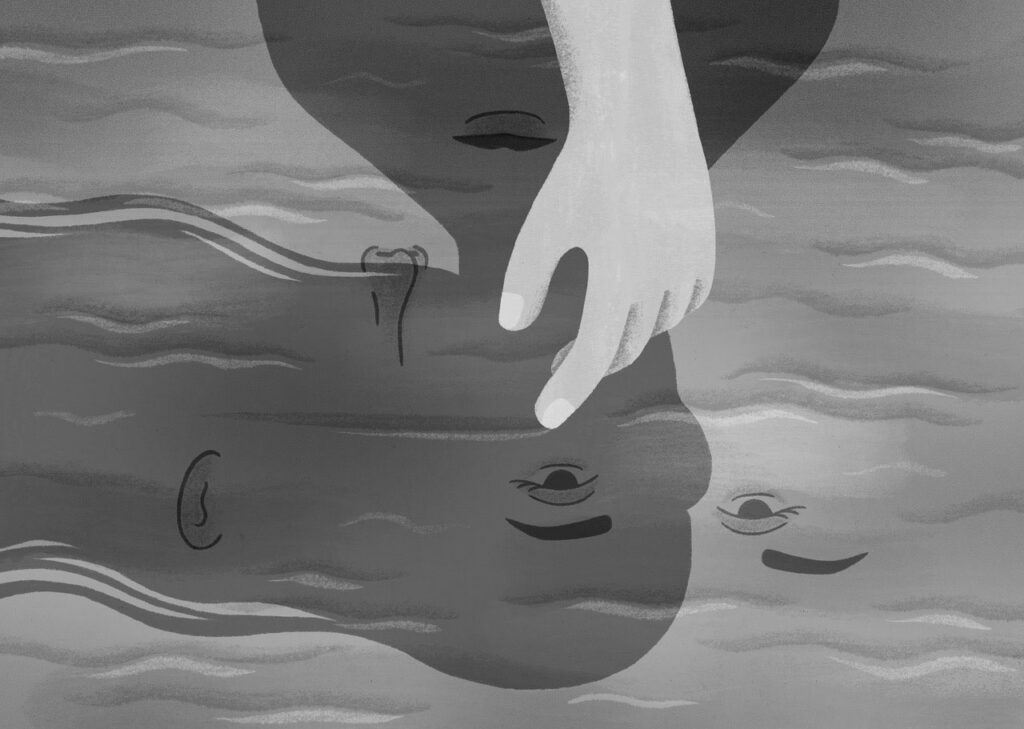A speaker wonders, “Is this beauty, all this grass?” Looking out on the prairies, at “grass-covered hill after grass-covered hill,” they ask their listener to “be quiet for once. Less / than your own boot print.” In her sixth collection, Wellwater, Karen Solie narrows her focus, looking to the ground and the “belowground” for what we can learn from detritus, soil, tendrils, puddles, sidewalks, and shadows “lying on the snow.”
Solie has always dealt in compression — of language, sound, images. Here it extends to the atmosphere. The sky is claustrophobic, flat, and unknowable. It hangs like an “attic / above the low ceiling” and obscures any sense of perspective. “I’ve never understood what ‘starlit’ means,” one voice admits. “On a clear night in their millions / they cast no discernible light.” Throughout, Solie refuses to have her readers squint and make meaning out of something in the distance. Even in the exceptional “Orion,” the speaker simply wishes to pass their earthly anger on to the god who “doesn’t care.” If there is any hint of the cosmos worth pursuing, her poems suggest, it is likely underfoot.
The only act more futile than looking for symbols in the expanse above us is trying to render it. In “Next Life,” Solie writes, “Someone desiring the blue of the sky was sold this earthly / mis‑tint, a wall colour that even in daylight feels / threadbare.” Instead, we should turn to our immediate, unassuming surroundings. “The Mash” begins, “On land judged unfit for use / what might appear stagnant is deep in a process.” In this sparse poem, the quiet “drama at street level” is revealed. “The slow-moving water of contemplation” allows for the complexity of the mundane to emerge, make itself known, and delight.

Surely, these collections remind us, revelations are at hand.
Paige Stampatori
Learning to examine the world and then representing it are the twin challenges clearly laid out in Wellwater. Sometimes the work veers into didacticism when instructing “you,” who is trying (and presumably failing) to deeply engage their environment. In “Bad Landscape,” this act proves near impossible. “I can’t make it right,” one voice complains of their failed sketch, with its “terrain sloping crudely.” The only person who lifts meaning effortlessly from his context is the speaker’s nephew in “That Which Was Learned in Youth Is Always Most Familiar.” He bursts through “the fields / in the dirty realism of early spring” with vision:
Auntie, I think there are two kinds of shapes.
Replaceable and irreplaceable shapes.
Triangles, circles, squares, we can make them. But this
— he held a clod of earth —
is an accident. Will never happen again.
Solie, who was born in Saskatchewan and now spends part of the year lecturing at the University of St. Andrews, in Scotland, shifts seamlessly between urban and rural settings. A handful of soil or “heat rising / from the just-sown fields” is as sacred as the “dad-rock moment // here on the sidewalk” watching a snowplow, with its “blade / at its superb angle,” pushing garbage and snow. The nitrogen “fixed inside the earth” may be as essential as the subterranean city dwelling described in “Basement Suite.” Although lacking in natural light and warmth, it is a “treehouse in the roots”: an inversion that puts its inhabitants “closer to God.”
These poems mine the ordinary, turning familiar shapes into uncanny and productive patterns. Immersions in the textures of everyday life lead to broader ideological criticisms. In “Dust,” the origin of this philosophical pursuit is traced to the back seat of the speaker’s grandfather’s car. “A sense of the conditional crept in through the vents,” she remembers, “like dust, the incense of the road / scrubbing the air of clarity, of all else but the demands of dust.”
Wellwater is an unerring recalibration. To counter an age of abstraction and illusion, Solie zeroes in on the overlooked. Her thoughts on our society and its issues — from the housing crisis to Monsanto and climate change — come through plainly and with her recognizable pith: “From the shop adjacent wafts the incense / of coffee and the vulgar muffins, overstuffed as geese / with funnels down their throats, truly the muffins of a culture on the brink / of steep decline.” In these forty-two masterful compositions, Solie asks her reader to see that “it is you // who are most definitely / not to scale.”
In Unravel, Tolu Oloruntoba considers landscapes both emotional and material. The physician and poet, whose debut collection won both the Griffin Poetry Prize and the Governor General’s Award for English-language poetry, guides the reader in an undoing. The opening poem, “Re‑Claim,” begins, “I am the city falling into the sea.” The self continues to splinter from there.
The Nigerian Canadian writer slides into a dreamlike state, one in which the personal and the geopolitical are intertwined to the point of becoming indistinguishable. He upends the notion of what it means to tell the difference between interior and exterior, collapsing the distance between world history and personal memory. The body becomes a symptom of its environment “with one divining-rod arm and one metal-detector, outstretched.”
Oloruntoba’s speakers are surprised by their own blurring boundaries: “The dream / delivered on my worst fear: / that I could become, / or was becoming an omen.” They are thin-skinned and cautious but maintain a certain sense of direction; their brokenness and wholeness move in lockstep. “I have raveled; have unraveled. / Have done and been undone,” says the enigmatic voice of “Contronym,” which meddles with the idea of opposition and resistance. “I feared the similarity of do and do not.” Drawing on Latin, Italian, Yoruba, and English, Oloruntoba offers a sustained consideration of language’s shortcomings and pluralities. In revealing its instability, he brings the reader into a deep sense of ambiguity.
Everywhere in this collection are failures — to understand, to decide, to walk steadily. Uncertainty abounds, as do dreams, nightmares, injuries, fears, and other vehicles for defeat. Instead of belonging, there is longing. Like the earthworm “exiled from its other half,” Oloruntoba “never stops reaching” for knowledge — in the form of stories, people, facts — that might soothe the fracturing mind. “I’ve been curing my confusion since birth,” one speaker says, holding up the double meaning of “cure” to the light: “Flesh. Salt. Smoke. / Jerk.” Here uncertainty becomes something to tend, preserve, and ultimately chew for sustenance. This idea crystallizes in “Found in Camus,” which consists entirely of fragments from The Myth of Sisyphus. “The important thing,” Oloruntoba writes, quoting the French philosopher, “is not / to be cured, but to live with one’s ailments.”
Oloruntoba refuses to arrive at clarity, but this aversion does not preclude authenticity or action. In a fugue state, real decisions are made and real beauty occurs. “There is perhaps an absolution / in a toddler going to sleep upon / my chest,” he writes of becoming a parent in “Secure Attachment.” In two short verses, he speaks clearly of surrendering oneself to another completely: “I have done this right, whatever things / I’ve also done wrong (and they are many).” Real pain takes hold too. In “Trembling,” the speaker notices “repo marks, tow-tracks / of the earth sampling me.” In this five-part poem made up of stilted, nervous tercets, he reacts to his body, noticing the way trauma has developed and wondering how to survive it.
Together, these fifty entries make a case for criticizing and ultimately tearing down both our egos and the larger societal systems. For Oloruntoba, there is no truth without a constant reappraisal of our needs. Even the familiar requires a complete upheaval: “Yes, I want to come home. // Not to the structure / we had welded ourselves into: / but a new and dangerous place.” Although composed of ever fragmenting parts, Unravel feels complete. Grounded in centuries of literary and scientific references — from the Bible to Jacques Derrida and contemporary therapists — these lines are dense and reinvigorating. “I became a question // for myself,” Oloruntoba writes, quoting Saint Augustine, whose Confessions are felt throughout this similarly forceful and expansive record of self-exploration.
“Always, I am gored by the ox of my confession,” admits the speaker of seven poems in Stephanie Roberts’s Unmet. After having recounted a dream to her lover, she feels “trampled / under the bull moose of candour.” Raw and regretful, she realizes “I have / ruined my life a number of times by wanting.”
These lyrics — which impart bare desires, promises, criticisms — have variable titles, like “Unmet,” “The Unmet,” and “Unmet & Unsent (To Another Southern Poet),” and read less like a series of linked thoughts than like a compulsive return to “you.” However far-flung the other thirty-seven poems are, we always end up back in the singular, intimate space where a voice clings nervously to their listener: “wherever you’re going / i am going with you.”
Elsewhere in her sophomore collection, Roberts, who has called Canada, Panama, and the United States home, brings her reader into elucidating moments of transition and disruption; wildfires burn in “late May, Nova Scotia,” the sun rises in Manhattan, and “spring swells abruptly in vaudreuil.” In “A Left-Handed Scissors for Paul McCartney,” the arresting penultimate poem, “the first jolt of thunder in months” sets off pages of powerful reflections, and each lightning flash brings the speaker further out of “usual winter” and into a state of restless metaphor making: “Help me, I can’t help myself.”
The resilience that romantic love affords its speaker shapes the book; strength and vulnerability grow in tandem. On a structural level, Unmet suggests that intimacy provides a necessary reprieve from the everyday hostility of society. A relationship between two people is presented as a universe unto itself, one that is safeguarded from misunderstanding, injustice, and violence — a space for unfettered truth and self-exploration. In alternately nervous and incisive modes, Roberts explores the profound contradictions behind even the most clear-eyed criticisms or desires. The strongest among us need a room — and arms — to fall apart in. In “Unmet: Again,” she urges her listener to see love as an antidote, an explanation, a way out: “tell fear your dreams never / slept not by my hands.”
As its title suggests, Unmet is a volume about needs. The poet sifts through various seasons of wanting, rejection, and “spanking new mistakes.” Desires layer upon each other, creating complex and uneven emotional movements that resist easy interpretation. “I would sell love,” Roberts confesses, “for the latest edition of The Roberts/Exhaustive Translation of Every Malignant Silence.” In a sustained meditation on poetry, “Wear You Out: Letter to a Southern Poet,” the importance of partnership disappears. She writes of her involuntary and unparalleled vocation: “We are burdened builders, architects of monuments of / sound.” The haphazard but urgent construction of a poem is intertwined with that of the self. Both might require you to “slow your heartbeat,” which she generously directs her reader to do in “The Process.” With a resolute inward stare, Roberts reveals the cumulative nature of life.
“The past is so poorly constructed, so unsuited to the living,” writes Solie in “The Bluebird,” which touches directly on the schismatic preoccupations coursing throughout these three works. In each, we glimpse a world that has become all too entropic and is moving swiftly toward destruction; in turn, profound anxiety and grief have taken hold of these voices, “though one had a sense of something slowly, // unrelentingly, being taken apart within.” With diverging modes for self-discovery, these poets all arrive at acts of dismantling. Suspicious of nostalgia and hope in equal measure, they fix their gazes intently on the strange, breaking present.
Emily Mernin is an associate editor at the Literary Review of Canada.

